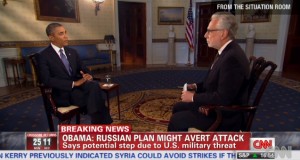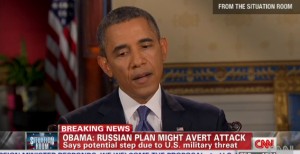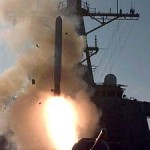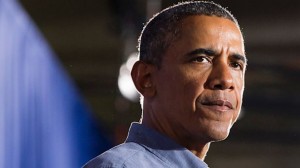DwD: So, why is the president all hyped to go to war against Syria? Sure, he says it is not a war, but it is an attack on Syria, which we must countenance as an act of war.
My thought, and it is one that has been bandied about by others, is that he doesn’t want this to happen all that much, that Congressional intransigence is being used against itself to scuttle the plan, eat up game time, and steal fire from the debt ceiling morass.
If that is true, it makes Obama the most crafty strategist ever to hold the seat. If it is just coincidence, then why take it to a do-nothing Congress when you don’t really have to?
 Ted: If you have a good political team in place, I think you can create A, B, and C groups to game out contingencies that may arise. The ”one plan, one message” method of political action is something that worked well for Bush and Co., but that was a time when they had a lot of post-9/11 political capital that created a unique opportunity for little dissent in Congress. I think you’re right that the Obama administration doesn’t want war. It’s a delicate balance that they have to maintain in this dance. It’s not kabuki theater, but in order to get the outcome you want, you have to put a number of processes in place and see how the major actors act. With Congress, Obama is giving them a share of the blame (or credit) in taking military action. The fact that this group is so used to disagreeing and, in the case of the Republicans, just saying no to anything Obama proposes, this is a chance to shift the game so Republicans can experience governance instead of having to constantly be an opposition party. With Syria and Russia, it was clear from the outset that Russia was going to be the one actor who would scotch any military strike through the U.N., so the sabre-rattling from Obama was one way to show that they were serious about using force to punish Syria’s use of chemical weapons. In a way, Obama was pushing Russia toward governance much like he was pushing Republicans to step up and share power with regards to military action. So, yes, I think Obama’s team had really gamed out a number of scenarios to see which ones would lead to the endgame they desired. I just wish Obama’s team was more politically savvy when it comes to domestic policy. Who knows, going forward, maybe they will be.
Ted: If you have a good political team in place, I think you can create A, B, and C groups to game out contingencies that may arise. The ”one plan, one message” method of political action is something that worked well for Bush and Co., but that was a time when they had a lot of post-9/11 political capital that created a unique opportunity for little dissent in Congress. I think you’re right that the Obama administration doesn’t want war. It’s a delicate balance that they have to maintain in this dance. It’s not kabuki theater, but in order to get the outcome you want, you have to put a number of processes in place and see how the major actors act. With Congress, Obama is giving them a share of the blame (or credit) in taking military action. The fact that this group is so used to disagreeing and, in the case of the Republicans, just saying no to anything Obama proposes, this is a chance to shift the game so Republicans can experience governance instead of having to constantly be an opposition party. With Syria and Russia, it was clear from the outset that Russia was going to be the one actor who would scotch any military strike through the U.N., so the sabre-rattling from Obama was one way to show that they were serious about using force to punish Syria’s use of chemical weapons. In a way, Obama was pushing Russia toward governance much like he was pushing Republicans to step up and share power with regards to military action. So, yes, I think Obama’s team had really gamed out a number of scenarios to see which ones would lead to the endgame they desired. I just wish Obama’s team was more politically savvy when it comes to domestic policy. Who knows, going forward, maybe they will be.
DwD: It comes at a severe price. Large swathes of his base now see this hawkish side. That, and the continued fallout from the Snowden situation, have painted him much more like Bush than anyone dared imagine.
Ted: I think presidents, no matter what their political stripes are, change once in office. It’s probably the nature of the office and the daily pressures to act (and sometimes react) to large and small fires the crop up. I’m a big fan of FDR, but even he was blamed for forgetting about the New Deal and become ”Dr. Win The War.” Sure the ”war effort” was a continuation of New Deal policies — directed at military spending — but Roosevelt was also the president who ordered the internment of Japanese-Americans and basically wrote into law the ability of whites to take their property. I’m also a fan of LBJ, but even he was a ”Dr. Win The War” when it came to Vietnam. It didn’t work for him, but he was serious about continuing New Deal policies to address poverty and raise the standards for middle and working class folks. I voted for Obama twice, and was happy to see that he was coming in with some progressive ideas, but I also knew his political pedigree, so I suspected that many would be disappointed by what he would be able to get through congress. I was sure it would be watered-down, centrist policy like Bill Clinton’s ”Third Way” politics, and for the most part it’s been just that.
Presidents are often tested in the international arena, and it seems that this was Obama’s time to see how he would react to a politically impossible situation. A civil war? Good lord, who wants to get involved in that! But he was kind of painted into a corner when it came to Syria and the use of chemical weapons.
The Snowden case…well, that’s something that very hard for me to be pragmatic about. We are in new territory when it comes to our online footprints and what that means for national security, but the kind of snooping our government does on us is pretty unforgivable. It’s not like the government hasn’t done this before (and will do it again). It’s just that for Obama to come in as an agent of change and then, to quote The Who, becomes ”Meet the new boss, same as the old boss” is baffling.
The media keeps saying that Obama is a ”lame duck,” but 2016 is three years away. I think his administration can get a lot done in that time. Question: what do you think Obama’s agenda is from here on out?
Jon: Who cares what Obama’s agenda is for the next three years? Nobody in this country can see three inches in front of his face, so let’s stick to the REAL subject at hand here: How do you feeeeeeeellllllll about the prospect of Obama attacking Syria?
 Personally, I’m as flummoxed by this ”crisis” as I have been about anything in many years – and I suspect much of the country feels the same way. And guess what – I think that’s the healthiest development imaginable, as far as our political culture is concerned. Ted, you were approaching my thoughts earlier, when you noted that Obama asking Congress to approve a resolution is giving/forcing the Republicans to ”experience governance.” But just as important – probably more important – Obama has given both Republicans and Democrats out here in the real world an opportunity … nay, a mandate … to look beyond partisanship and come to grips with what we really think about the use of force and America’s role in the world.
Personally, I’m as flummoxed by this ”crisis” as I have been about anything in many years – and I suspect much of the country feels the same way. And guess what – I think that’s the healthiest development imaginable, as far as our political culture is concerned. Ted, you were approaching my thoughts earlier, when you noted that Obama asking Congress to approve a resolution is giving/forcing the Republicans to ”experience governance.” But just as important – probably more important – Obama has given both Republicans and Democrats out here in the real world an opportunity … nay, a mandate … to look beyond partisanship and come to grips with what we really think about the use of force and America’s role in the world.
There are millions of Republicans out there who have allowed themselves to be convinced that everything Obama does, or even might consider doing, is wrong. At the same time, however, the majority of those same Republicans have been brought up (in no small part by the previous president, whose name must never be spoken) to believe that Americans must play an assertive and often violent role in the world to project our values and protect our interests. This Syria business is forcing them to confront the collision of those two core beliefs. Simultaneously, there are millions of dovish Democrats who are now being forced to calibrate their affection for Obama with their tendency to avoid gratuitous conflict (which these ”limited” missile strikes almost certainly constitute).
Is it too much to ask that, no matter what happens, we end up using this Syria debate as a teaching moment? Might the inner conflicts that many of us our experiencing now inform a future tamping down of partisan fervor – the sowing of doubt among some Republicans concerning their long-held suspicions of Obama’s ”lead-from-behind” weakness, and the recognition among some Democrats that for the last two weeks they’ve had something significant in common with Ted Cruz and Rand Paul?
Probably not. But it’s worth discussing. Of course, now that this entire let’s-go-bomb-the-bad-guys adventure might be waylaid by — horrors! — diplomacy, the right and the left can start throwing rocks at each other over who’s responsible for making Vladimir Putin look like a voice of reason all of a sudden.
 DwD – Personally, the most hawkish move would have been abstention, although that would have been hard to show. Caught between a regime backed by Hezbollah and a rebel force that (in segments) is backed by al Qaeda are innocents. True enough, and they died horribly. But which terrorist organization do you align with? Which is the ”enemy of my enemies?” In either case, we were risking propping up Saddam Hussein against Ayatollah Khomeini all over again, and that doesn’t get talked about enough.
DwD – Personally, the most hawkish move would have been abstention, although that would have been hard to show. Caught between a regime backed by Hezbollah and a rebel force that (in segments) is backed by al Qaeda are innocents. True enough, and they died horribly. But which terrorist organization do you align with? Which is the ”enemy of my enemies?” In either case, we were risking propping up Saddam Hussein against Ayatollah Khomeini all over again, and that doesn’t get talked about enough.
As for siding with Paul and Cruz, that will be used come election time as a token effort to ”reach across the aisle” (BLEAGH.) and not much more. It is unfortunate, because you are more effective against the nuttier aspects of Ted Cruz if you can dig into the aspects where you find common ground. You no longer approach things in that all-or-nothing manner and can then say, from a higher horse, I disagree and you know it’s not out of spite because here is where we have agreed in the past, Spunky.
Sidebar: does this ultimately hurt Hillary Clinton’s electability because she was leaning in to the administration trajectory?
Ted: When have we learned anything from a lead-up to a war or military conflict? One of the reasons why intransigence works so well for Republicans is because it brings in money for campaigns. The pathological hatred some on the right have for Obama has some similarities to the left’s hatred for Bush. Now, the biggest difference is the way in which Bush was installed in office, and how he used his power to push us into Iraq by linking the need to topple a regime with the terrorists who attacked us on 9/11. By and large, the left’s hatred of Bush was about the way he governed and not the color of his skin, or that he was able to use his charisma to win two elections by large margins.
 Red states vs Blue states, or an identity/other dyad is what’s currently rallying the Republican base. Republicans need the ”otherness” of Obama to demonstrate their own ideological (and in some cases, racial) purity. Many in the party may not even believe the bullshit they are shoveling, but it plays well in Peoria and it keeps the mother’s milk of politics flowing.
Red states vs Blue states, or an identity/other dyad is what’s currently rallying the Republican base. Republicans need the ”otherness” of Obama to demonstrate their own ideological (and in some cases, racial) purity. Many in the party may not even believe the bullshit they are shoveling, but it plays well in Peoria and it keeps the mother’s milk of politics flowing.
Regarding Hillary: she has three years to carve out an identity, so I don’t think she’ll be hurt in any way. People have short memories.
Jon: I can’t believe Hillary is even a topic of conversation here. It’s just one more bit of evidence showing what a clusterfuck this whole Syria deal is. Even the bombing of a nasty foreign power becomes grist for the who’s-up, who’s-down armchair-quarterback mill. Honestly, shouldn’t the entire political blathertariat (including us) put a temporary hold on the ”What does THIS mean for Hillary?” game while we pursue something as serious as holding Syria accountable for WMD use? Or, alternatively, is Syria really not that important?
I’ve been thinking about that last question a lot lately, as I’ve tried to wrap my head around why Obama went to Congress in the first place. Clinton probably bombed Iraq in 98 about as much as Obama’s been planning to bomb Syria, and nobody bitched and moaned about getting the UN or Congress’ approval back then. Of course, at that time everyone was distracted by the shiny object  that was Monica, and accusing Clinton of wagging the dog, but whatever – the bombing wasn’t the constitutional crisis du jour. My point is, if Obama really wanted to give Assad the what-for, shouldn’t he have just pushed the button and asked for forgiveness later? And if he has never planned to use ground troops, which he obviously hasn’t planned and couldn’t do anyway because we don’t have any, why are we putting ourselves through all this sturm und drang over a few (dozen) cruise missiles?
that was Monica, and accusing Clinton of wagging the dog, but whatever – the bombing wasn’t the constitutional crisis du jour. My point is, if Obama really wanted to give Assad the what-for, shouldn’t he have just pushed the button and asked for forgiveness later? And if he has never planned to use ground troops, which he obviously hasn’t planned and couldn’t do anyway because we don’t have any, why are we putting ourselves through all this sturm und drang over a few (dozen) cruise missiles?
The fact that I’m ending more sentences with question marks than periods here is testament to my utter confusion on this issue. I heartily believe that the ”international norm” against chemical weapons use (as they’ve been calling it lately, artlessly) should be maintained, but Obama certainly hasn’t made his case that the strikes for which he’s been calling would be effective in doing anything more than moving rubble around.
DwD: It can’t be put on hold because it won’t be put on hold. Come on, Jon. You know that as distasteful as it may be to submit her into the conversation, we are watching the video clips that will be drilled into us for the next three years. Whether we like it or not, we have to accept that.
 Ted: I think it’s been clear that Obama didn’t want to act unilaterally on this issue, but had to find a way to ”get Russia onboard” (I’m just using quotes for effect). I would imagine Obama had a military option as a real option on the table, but was going to use it as a final option. (I just used the word ”option” three times). The threat of U.S. military action (even limited action) was enough to shake Russia out of their opposition and find a solution to the issue. Everyone seems to want political cover, but the reality (to me, that is) goes back to what I wrote at the outset: the Obama administration knows what they want. They want international pressure on Syria and a way they could get it was to have the threat that the U.S. would act unilaterally. When the CNN countdown clock started, it was effective PR for the administration both internationally and domestically. I think in terms of pure politics within a constitutional framework, Obama has demonstrated he’s a very good politician. Alas, his political skill seems to work best in the international realm.
Ted: I think it’s been clear that Obama didn’t want to act unilaterally on this issue, but had to find a way to ”get Russia onboard” (I’m just using quotes for effect). I would imagine Obama had a military option as a real option on the table, but was going to use it as a final option. (I just used the word ”option” three times). The threat of U.S. military action (even limited action) was enough to shake Russia out of their opposition and find a solution to the issue. Everyone seems to want political cover, but the reality (to me, that is) goes back to what I wrote at the outset: the Obama administration knows what they want. They want international pressure on Syria and a way they could get it was to have the threat that the U.S. would act unilaterally. When the CNN countdown clock started, it was effective PR for the administration both internationally and domestically. I think in terms of pure politics within a constitutional framework, Obama has demonstrated he’s a very good politician. Alas, his political skill seems to work best in the international realm.
Jon: Yeah, don’t try to talk the crazies in the GOP rage machine into that sort of thinking. To their minds, diplomacy (like the use of force, like everything else) is a zero-sum game. Putin has played Obama like a fiddle to get what HE wants (Assad’s stability), and Obama has bumbled his way into making the US look weak in the face of terrorists, dictators, Communists, whomever.
DwD: And that is the most disappointing aspect about all this. We can’t hope for true diplomacy first. I was upset by the prospect that we were so quick to jump into that ”police force of the world” role. I do think about those innocent people who died in the chemical attack, but I also think that our country cannot be the moral compass of the world. We’re much too screwed up for that. Perhaps it is time for somebody else to take a unilateral position…
Jon: Hellllloooooooo, Israel!
Or maybe it’s time for no one to take unilateral positions anymore. Over the last two weeks, the UN Security Council (i.e., Russia and China), much of the emerging world, and (it seems) the US Congress have all said ”We want nothing to do with what’s going on in Syria. Even if Assad has proven he’s willing to go to the extreme of gassing his own people, and even if Syria is a country the size of New Jersey…
DwD: Hey, there now!
Jon: …with remarkably porous borders (including one with a sworn enemy), we’re just gonna close our eyes and pretend it doesn’t matter.” What’s a president, whatever his intentions (let’s assume they’re sincere and honorable), to do in the face of such diffidence?
DwD: I suppose, circling back to where we started, what he does is hope that was the endgame all along. If Obama has found a way to manipulate Congress via a very convoluted version of reverse psychology, that would be something worth looking into. If this is just business as usual — deny the President the lollypop he so desperately wants — then this week has been a lot of somersaults and handstands for nothing, same as always. EXCEPT, hopefully, the ”rest” of the world is so sick of the monotonous drumbeat of war that it won’t matter who’s playing who, what or why.
It would be so nice to believe that (Cough — North Korea is feeling neglected again — cough.)
 Ted: Talk about convoluted. Many of the political writers I read were spinning in circles trying to follow the logic of Obama’s speech last night. I suppose since we’ve been discussing this prior to his speech, we were able to focus on a number of minute points that don’t get covered in the breathless reporting of ”When are the bombs gonna fly?” I was able to follow what he was saying, and that’s basically what we’ve highlighted above: the military option is on the table, but a diplomatic solution will be played out first. If that doesn’t work, then CNN can start the countdown clock again.
Ted: Talk about convoluted. Many of the political writers I read were spinning in circles trying to follow the logic of Obama’s speech last night. I suppose since we’ve been discussing this prior to his speech, we were able to focus on a number of minute points that don’t get covered in the breathless reporting of ”When are the bombs gonna fly?” I was able to follow what he was saying, and that’s basically what we’ve highlighted above: the military option is on the table, but a diplomatic solution will be played out first. If that doesn’t work, then CNN can start the countdown clock again.
Jon: Of course, in our 24/7 news environment, it required almost no time at all before ”news analyses” began pouring out with headlines such as, ”Securing Syria’s WMD Might Take Years.” Well, of course it might … but any jug (vat? thermos?) of Sarin that requires a couple years to track down is a canister (vaporizer? seel-tite Tupperware?) of Sarin that probably wouldn’t be located by the most targeted cruise missile, either … or if it were, the consequences of blowing it up likely would be even more catastrophic.
In any case, as with so many situations in contemporary public affairs, it’s time for folks to take a (hopefully unpoisoned) breath and allow things to play out for a while. The U.N. frequently does manage to find the diplomatic sweet spot where others have failed, when it comes to fashioning a resolution that will even get the Russians’ sign-off. (And then, of course, the far-right can scream about the US forfeiting its sovereignty to a bunch of folks that don’t look like us. But then we can go back to ignoring everything the far right says about international issues, and return our focus to their immoral threats of shutdowns and debt defaults.





Comments